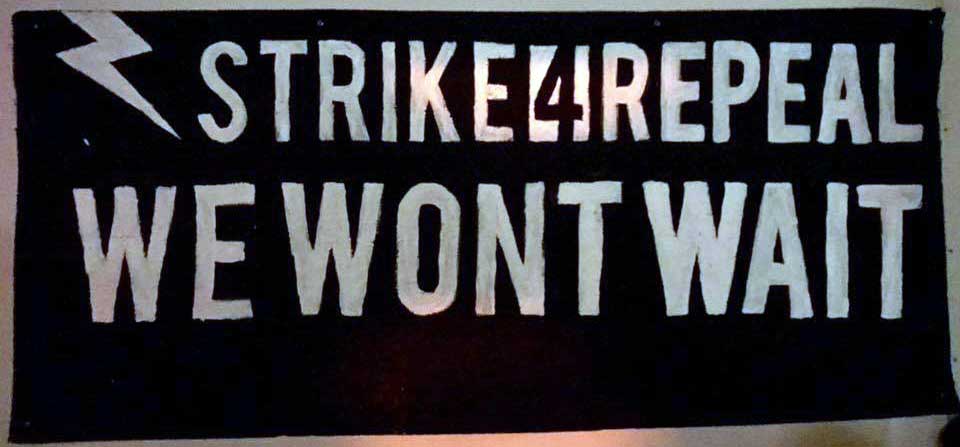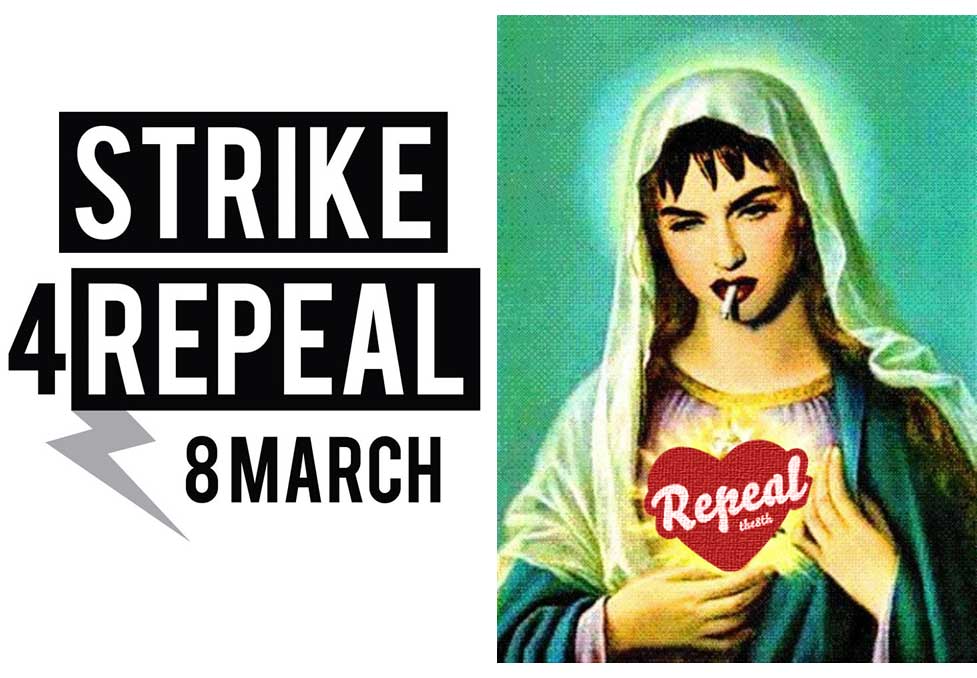Over 30 years of anarchist writing from Ireland listed under hundreds of topics
8 reasons to 'Strike for Repeal' this 8th March
The WSM are supporting and taking part in the ‘Strike for Repeal’ events on March 8th, intended to demand the government stop stalling and introduce a referendum to repeal the hated 8th amendment that denies access to abortion. We have been fighting Ireland’s anti-abortion access laws since the 1980’s, a period when they meant books and magazines were being banned because they had contact details for clinics in Britain. We continue to demand that access to termination be an option to be decided on by a pregnant person as part of a free health service. The 8th amendment should never have been introduced, the referendum to repeal it should be delayed no longer.

What follows are 8 of the reasons to take part in ‘Strike for Repeal’ events near you Wednesday followed by links to all the Facebpok event notices across Ireland and elsewhere.
1. World-Class Tyranny
Ireland has one of the most restrictive abortion laws in the world more so than places like Syria and Afghanistan. Only Malta is more restrictive within the EU.
2. Democracy & Equality
No woman of child-bearing age has been allowed to have a say in her reproductive rights.The last vote was in 1983. This country claims to be democratic yet denies women basic medical services and control of their bodies. In the Irish law a woman’s life is equal to the foetus. This is not equality.
3. Exile
Up to 12 women a day travel abroad for an abortion but not every woman can travel. Migrant women and asylum seekers, women with disabilities, minors and predominantly working-class women are discriminated against here. The abortion ban only increases class divides and helps to perpetuate the cycle of poverty.
4. Abortion Pills
The other option is to use abortion pills but it is illegal to obtain them, and increasingly pills are being seized by customs, women who take them are at risk of being reported to the police if they have complications or need follow up care.
5. Trans, Non-Binary, & Intersex people
Trans-Men, non-binary people and some inter-sex people need access to abortion too. For some trans men, being forced to carry a pregnancy to term (or at all) is in serious conflict with their identity as men and can be traumatic as it forces them to do something with their bodies that feels alien to them. Trans people are invisible in Irish law and their struggle for bodily autonomy is a part of the struggle for reproductive rights.
6. Rape
If a woman is raped in this country and is caught having an abortion she will do more time in prison than her rapist. A woman faces a jail sentence of 14 years if she has an abortion whereas the maximum jail term for rapists is 10 years. Women who are raped are not entitled to abortions and face the trauma of being blamed for assault by a patriarchal police which assumes that it’s a woman’s responsibility not to get raped (i.e. don’t wear the wrong clothes, don’t drink too much, don’t go out alone, etc.)

7. Fatal Foetal Abnormality
A woman is not allowed to have an abortion in Ireland even in cases of Fatal Foetal Abnormality. Instead Ireland offers prenatal hospices where women can wait out their pregnancies as they wait for the foetus to slowly die inside them. Moreover, unless the pregnancy itself is a direct threat to the mother’s life she may not have an abortion and can be refused treatment for other conditions if it threatens the health of the foetus. Pregnant women with cancer have been refused both abortion and chemotherapy at a doctor’s prerogative.
8. Cruel and Unusual Punishment
Forcing a woman to carry a pregnancy against her will has been called ‘cruel, inhumane and degrading’ by the UN Committee on Human Rights. Abortion is legal in Ireland only if there is a high risk of death to the woman. Suicide is grounds for an abortion but the woman has to be assessed by up to 6 doctors. These doctors have the power to decide if a woman will be allowed an abortion. These doctors must be HSE approved and this panel only includes 1 psychiatrist. And the Ms.Y case has proven that the ‘protection of life’ provision offers no protection at all to suicidal women.

